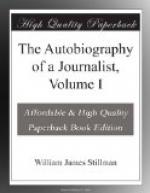In my oldest brother, Thomas B. Stillman, known in the last generation as the chief of the steam engineering of his day in the United States, the mentor of that profession, I can see more of my mother than in any other of the six brothers. He inherited, like all of us, his father’s mechanical tendency and inventiveness, and added to it a persistency and constancy of purpose peculiarly hers, which none of the other children inherited to the same extent; and he had in its fullness the devotional sentiment, the absorption in religious duties, as the chief motive in life, which was her ruling passion,—for passion it was in her,—the hanging on the Cross of everything she most valued in life.
My mother, Eliza Ward Maxson, was born in Newport, Rhode Island, on September 11, 1783, my father being seven years her senior. The childhood of both was, therefore, surrounded by the facts and associations of the war of American independence. He, in fact, as I have heard him say, was born under the rule of the King of England, and his father considered the Revolution so little justified that to the day of his death he refused to recognize the government of the United States; but, living a quiet life on his farm, he was never disturbed by the pressure which exiled the noted and active Tories.
My mother’s earliest recorded ancestor was a John Maxson, one of the band of Roger Williams, driven by the Puritans out of Massachusetts into the wilder parts of “Rhode Island and Providence Plantations,” where—in the absence of all established law, as well as government—they might worship God in the way their consciences dictated, free from the restrictions on the liberty of conscience imposed by the Pilgrim Fathers. There, at last, complete freedom of dissent was found, and one of the consequences was that the colony became a sort of field for Christian dialectics, where the most extreme doctrines on all points of Christian belief were discussed without other or more serious results of the odium theologicum than the building of many meeting-houses and the multiplication of sects. Among these sects was one which played an important part in the local theology of that day and for many years afterward, that known as the “Seventh-Day Baptist,” to which, it seems, John Maxson belonged. It was not a new invention of the colonists, but had existed in England since the days of early dissent, and it is possible that John Maxson had brought the doctrine with him from England. Adhering to the practice of baptism by immersion, the sect also maintained the immutable obligation of the Seventh-Day Sabbath of the Ten Commandments, the Jewish day of rest.




